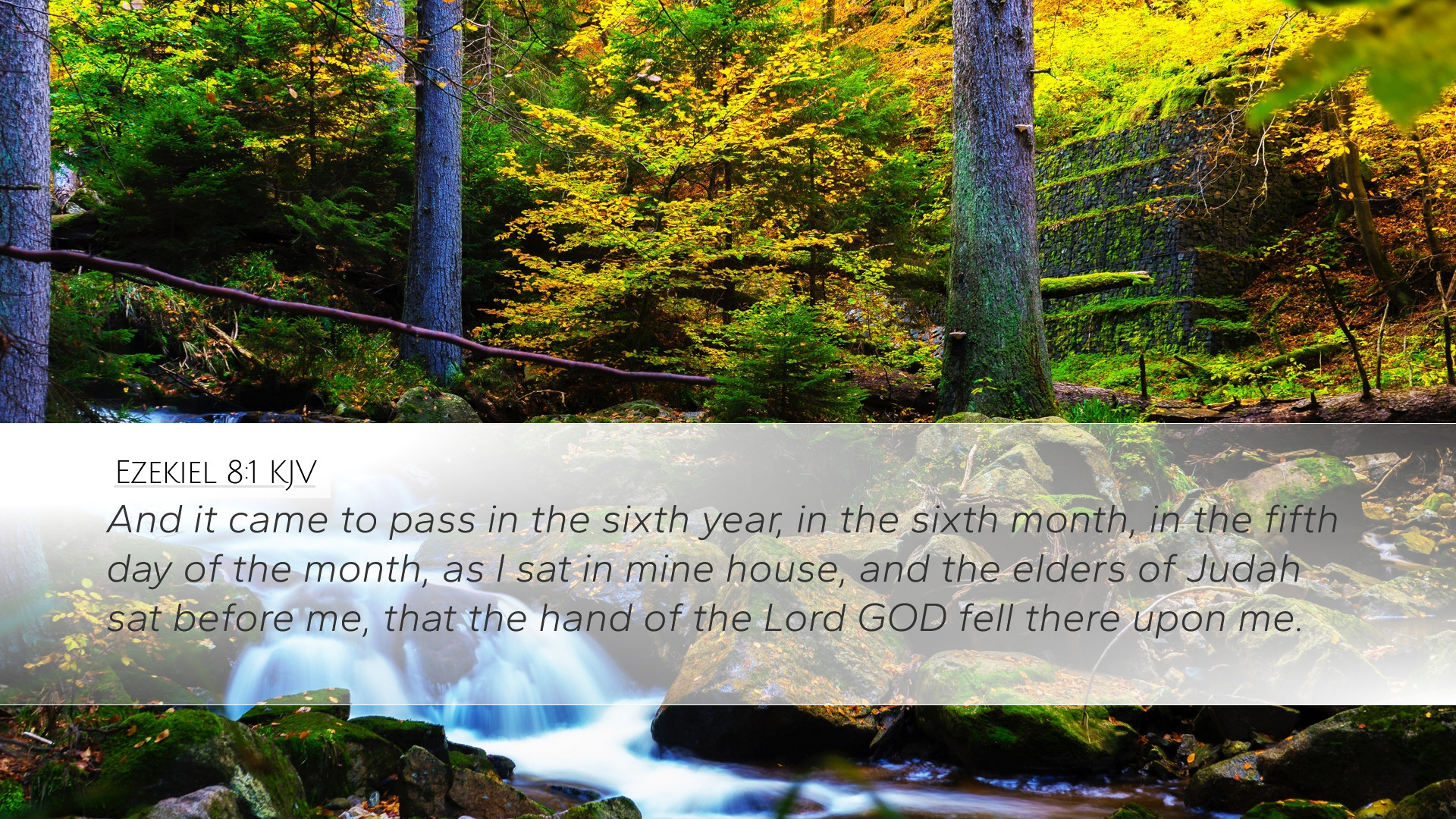Commentary on Ezekiel 8:1
Ezekiel 8:1 states:
"And it came to pass in the sixth year, in the sixth month, in the fifth day of the month, as I sat in mine house, and the elders of Judah sat before me, that the hand of the Lord God fell there upon me."
This verse serves as the introduction to a significant prophetic vision that Ezekiel receives, marking a pivotal moment in his ministry as a prophet of God. The combination of time indicators and geographic setting establishes the context in which the message is delivered.
Contextual Analysis
To appreciate the depth of this verse, it is crucial to understand its context. This marks a specific time in the sixth year of the captivity of Judah:
- Historical Background: Ezekiel’s prophecies are set against the backdrop of the Babylonian exile, a time of national catastrophe for Israel.
- Time Frame: The mention of the sixth year of captivity emphasizes the chronological order of Ezekiel's prophetic messages and invites an understanding of the ongoing spiritual decline in Judah.
- Geographical Setting: Ezekiel's position in his house signals a private and contemplative space, highlighting the gravity of the spiritual revelations about to unfold.
Theological Significance
The phrase "the hand of the Lord God fell there upon me" is packed with theological implications:
- Divine Encounter: This expression indicates a direct and sovereign intervention of God in the life of Ezekiel, suggesting that what follows is divinely ordained.
- Prophetic Authority: The hand of the Lord signifies an empowering force; Ezekiel is not merely a passive observer but an active participant in the communication of divine truth.
- Judgment and Revelation: This moment is significant not only for its immediate revelation but for the broader discourse on judgment that will follow regarding the idolatry and corruption present among the people.
Insights from Public Domain Commentaries
Matthew Henry's Commentary
Matthew Henry emphasizes the temporal details in this verse, suggesting that the specification of time serves to remind readers that God's work occurs in specific contexts and historical moments:
"It is of great moment to take notice of the time and circumstances wherein God conveys his messages; such a notation also signifies the certainty of the predictions, as all events are marked by time."
Henry further elaborates that sitting in the house while the elders were present shows a communal setting for divine revelation and points to the need for spiritual leaders to be receptive to God's will.
Albert Barnes' Notes
Albert Barnes provides insight into the social aspects of the gathering. He points out:
"The elders of Judah represent the leadership and the spiritual state of the people, and their sitting before Ezekiel indicates a posture of inquiry, suggesting they were seeking guidance during tumultuous times."
Barnes believes the act of God falling on Ezekiel denotes the profound seriousness of the message to come, as it would address the corruption that elders ought to combat.
Adam Clarke's Commentary
Adam Clarke notes the significance of the "hand of the Lord" falling upon Ezekiel as synonymous with being filled with the Spirit of God. He explains:
"This divine impartation qualifies Ezekiel to see and understand the things which are to be revealed, underlying the serious role of prophecy as both a blessing and a burden."
Clarke further elaborates on the stark contrast between the physical abode of the prophet and the spiritual decay of the city, suggesting a motif of separation that transcends physical locations and penetrates spiritual realms.
The Role of Prophecy in Ezekiel's Context
As the narrative unfolds, it becomes evident that the vision bestowed upon Ezekiel is not merely for personal edification but for the confrontation of communal sin:
- Intercession and Judgment: Ezekiel's role as a prophet is to intercede for Israel yet also to pronounce judgment on its iniquities.
- Call to Repentance: The visions will lead to a clarion call for repentance that holds both immediate and eschatological significance for the people of God.
- Spiritual Awakening: The revelation is intended to awaken the leaders and the people from complacency, urging them to return to genuine worship and devotion to God.
Conclusion
Ezekiel 8:1 invites pastors, students, theologians, and Bible scholars to dive deep into the narrative and contextual richness of this verse. The elements of time, divine intervention, and communal reflection serve as a powerful reminder of God's continual call for holiness amidst human failure.
This verse, setting the stage for the detailed revelations that follow regarding idol worship and the need for repentance, emphasizes the prophetic task of confronting sin with God’s truth, highlighting a consistent theme throughout the book of Ezekiel.


